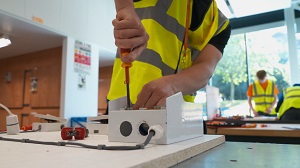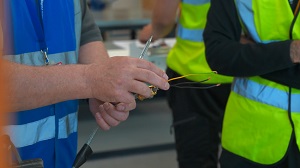Preparing to deliver T Levels: How Oldham College prepared their staff, workshops and wider college teams to deliver T Levels for the first time
Earlier this year we visited Oldham College who have been delivering the Building Services Engineering T Level since 2021 and have since added more T Levels to their curriculum.
As one of the first colleges to deliver T Levels, we wanted to speak to Tom Leahy, Head of Department for Building Services about some of the ways in which they prepared to successfully deliver T Levels, what they found worked well as well as things they have since changed.
Q: How did you prepare during the 12-month countdown to delivering T Levels?
 To prepare our staff to deliver T Levels we did a number of different things. The first one was to join with ETF and carry out their skills analysis to make sure that all our staff were fully aware of what was required as part of the qualification.
To prepare our staff to deliver T Levels we did a number of different things. The first one was to join with ETF and carry out their skills analysis to make sure that all our staff were fully aware of what was required as part of the qualification.
As a college we also decided to recruit T Level Coordinators. This allowed us to develop course materials, resources, schemes of learning, and really get to grips with what the T Levels were all about. We did this up to six months prior to our T Level delivery starting.
And finally, one of the big things that we do at Oldham College is recruiting staff from the industry. It allows us to ensure that all our staff members are fully up to date with the knowledge, skills, and behaviours for delivery on our T Level programme.
Q: How did you decide to structure the curriculum and structure the delivery into the academic week?
A lot of our delivery patterns are over three days. That allows two days for the industry placement. In addition to that, we also use Google Classroom and remote study to prepare the learners for the core exams.
Offering the practical in year one ensures that all our learners get the basic skills for their Occupational Specialism. We give them the basic knowledge, skills, and behaviours to be able to make a start. They learn all the basics such as materials, tools, and equipment, and develop their skills for installation, which will then prepare them for moving into that second year.
The way the course is structured totally differs from our normal sort of diploma qualifications. A lot of our diploma qualifications are 50:50 split; 50% in the classroom, 50% in the workshop. Whereas with the T Levels, what we're generally finding is in year one, it's around about 90% in the classroom and 10% in the workshop, and then in year two it's pretty much 90% practical (workshop) and 10% theory (classroom).
Q: How did you use the support provided by City & Guilds?
 The delivery materials and support materials offered by City & Guilds allowed us to embed all the KSBs (Knowledge, Skills and Behaviours) into the qualification. It provided a starting point for all our tutors to be able to develop their own unique and differentiated sessions for all our learners and prepared us for the qualification for the next two years.
The delivery materials and support materials offered by City & Guilds allowed us to embed all the KSBs (Knowledge, Skills and Behaviours) into the qualification. It provided a starting point for all our tutors to be able to develop their own unique and differentiated sessions for all our learners and prepared us for the qualification for the next two years.
We use the textbook, the City & Guilds website, the PowerPoints, the worksheets, etc., and we can bring our own activities in on top of that or develop materials for ourselves to make sure the students achieve.
Q: What was the biggest challenge you faced?
One of the biggest challenges we faced during the implementation of T Levels was ensuring that all staff were fully aware of the qualification. To prepare us for that, we sent staff on webinars, we sent staff to City & Guilds events and provided a lot of in-house CPD to ensure that learners and the staff were prepared moving forward.
Q: What are you going to do differently this year?
What has worked really well is all the support and resources from City & Guilds. And it’s the collaboration between different teams and the wider colleges on the T Level journey.
In relation to what we do better, we'd look at splitting up the core assessments within the first year. It'd be great for learners to undertake the two core exams within the summer window and the Employer-Set Project in the autumn window. Then moving onto the Occupational Specialism in the second summer series.
Something else we’ve changed throughout our T Level delivery is exam preparation. After completing the first series we identified that there was a requirement to improve learners exam answering techniques. Moving forward we're doing a lot more embedding of exam techniques to allow learners to progress and complete the exams to the best of their ability.
Q: What was the level of interest like from learners and what activities did you do to tell learners about the new courses you were going to be offering?
 The level of interest has increased year on year. Our school liaison team carry out a number of school visits where they'll take the VR headset in, and they'll also take our T Level van, which prepares the learners and gives them the information they require to move forward with their choices.
The level of interest has increased year on year. Our school liaison team carry out a number of school visits where they'll take the VR headset in, and they'll also take our T Level van, which prepares the learners and gives them the information they require to move forward with their choices.
In order to prepare learners and arm them with the information they require about T levels we've done a big marketing campaign. We also deliver welcome events where we bring learners in, discuss T Levels, explain what the programmes are all about and what the progression routes are.
Q: How did you address the industry placement?
To engage with all our industry placement companies, the first thing we did was set up breakfast events that allowed companies to come in to discuss the T Levels. We gave information relating to the requirements of industry placement, grants available and the requirements moving forward of how we can progress the learners onto an apprenticeship or onto the next level of study.
The delivery pattern of our industry placement ranges. It all depends on what the company wants; some take learners for two days a week, some prefer block release. Industry placements generally start towards the back end of the first year.
In addition to industry placements, we also deliver a lot of CPD and a lot of sessions where we've got companies coming into the college to deliver content as part of the industry placement requirements.
Q: What advice would you give to other colleges who are about to start delivering T Levels?
The one piece of advice I would give to any college looking at starting T Levels would be to make sure that you prepare all your staff, and you get everything ready for September.
It's all about the preparation and getting ready for the programme. Go to the webinars, go to the events at other colleges and T Levels events that are running, visit other colleges to see how other people are doing it, and just take advice.
You can find more information about T Levels on our website.